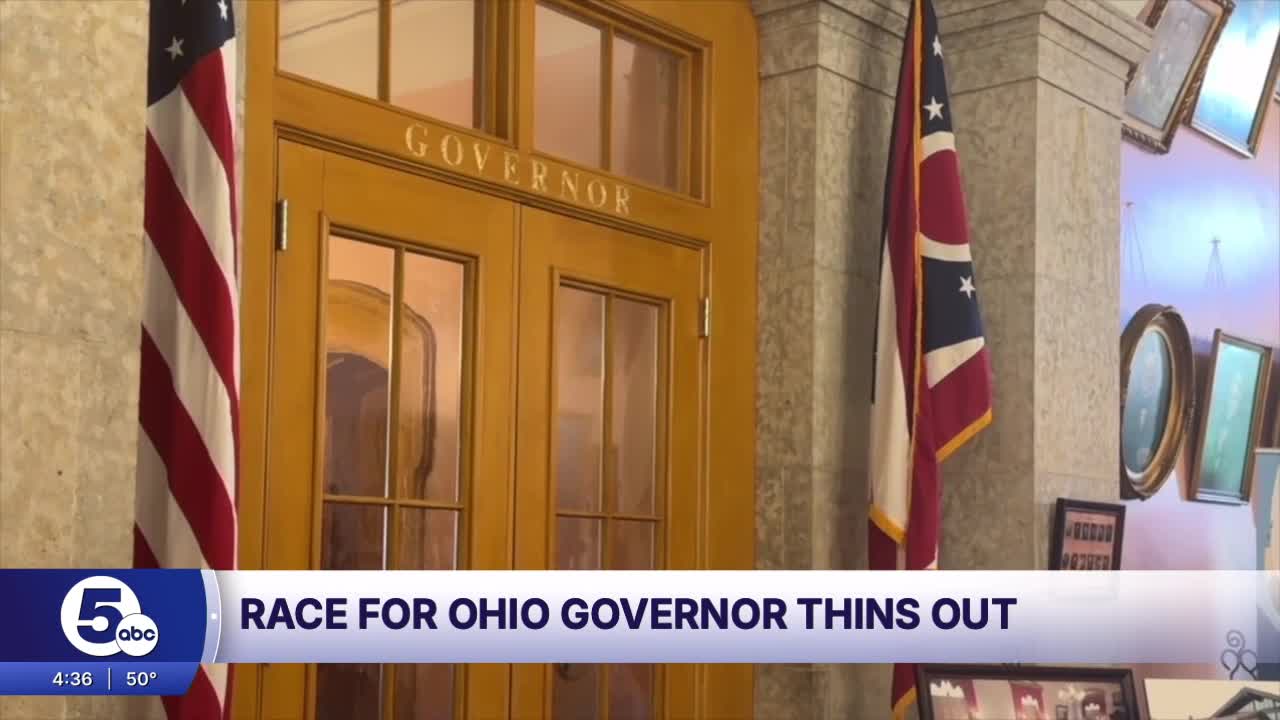COLUMBUS, Ohio — The Ohio governor's race is narrowing as Democrat Dr. Amy Acton gears up for a fight against Republican Vivek Ramaswamy, likely avoiding a costly primary battle.
"Together, we are going to build the Ohio that we all want to live in," Acton said in an interview on Friday afternoon.
Former Congressman Tim Ryan announced this morning that he will not be running for governor. This means Acton will remain the Democratic frontrunner.
RELATED: Former Ohio Congressman Tim Ryan not running for governor
But for Acton, Friday was just another day on the campaign trail.
"Was this a surprise?" I asked Acton, who had noted she hadn't spoken to Ryan in months.
"People like to create stories and drama, but I can tell you the work that we're doing on the ground every day has been my focus," Acton said.
She is also focused on facing off against Ramaswamy.
RELATED: Here's where Ohio's race for governor stands
GOP leader Tony Schroeder said he was never worried about Ramaswamy's chances, but the party would be more prepared to fight Ryan.
"Our great vice president, then Senator JD Vance, showed us a pretty good lesson on how to defeat Tim Ryan, and the playbook was already there," Schroeder said. "I think the playbook would be a little different this time."
Each candidate is focusing on affordability, but Acton hopes to sway voters by supporting public education and health care. Ramaswamy hopes to, and is succeeding, at getting the backing of Ryan’s former union support.
"While the Democrats have spent months fighting to secure their shrinking base, Vivek has been talking to voters of all political persuasions to build an unprecedented coalition of support that includes conservative leaders and farmers to truckers and labor unions — and we’re just getting started," Ramaswamy's spokesperson Connie Luck said after Ryan's decision was announced.
"If you're receiving union backing as a conservative Republican, you're reaching a different sort of coalition, and I think that's what we're looking at coming into 2026," Schroeder said.
Both Ramaswamy and Acton are also trying to make their campaigns about uniting the state, with Acton reminding the public that she worked closely with Gov. Mike DeWine.
RELATED: Ohio Gov. DeWine won't make endorsement for successor as new candidates debate run
The governor, unlike the majority of the Statehouse and congressional leaders, has not endorsed a candidate. Previously, he told us he would support the Republican Party. Several weeks ago, he told me he would be endorsing Ramaswamy "soon."
"Why have you not endorsed Vivek Ramasamy yet?" I asked DeWine on Friday.
"That's coming very soon," he responded.
I tried to find out when, but the governor smirked.
RELATED: DeWine's dilemma with the 2026 gubernatorial race
Acton and Ramaswamy have raised record amounts, money that Acton will get to save for the general election — instead of a contentious primary.
"Do you think that now the Democratic Party can fully come together to support you?" I asked her.
"Well, I think what I'm seeing is that people in Ohio are uniting, uniting to create the kind of state that we all want to live in, that we all deserve," Acton said.
She said she has started vetting for her lieutenant governor, which both she and Ramaswamy are expected to announce in the coming weeks.
Other candidates who have filed to run for governor include Republican Philip Funderburg, Democrat Jacob Chiara, and independent Tim Grady. Heather Hill had previously announced she would run as a Republican but later stated she would run as either a Libertarian, an independent, or a member of Elon Musk's America Party — a party that is not yet recognized in Ohio. Together, that group has reported having about $1,500 cash on hand.
In contrast, Ramaswamy reported raising $9.7 million, and Acton reported about $1.4 million.
RELATED: Why both top gubernatorial candidates have a good fundraising story to tell
To make the primary ballot, a governor and lieutenant governor candidate must collect petition signatures together. Party candidates have a deadline of Feb. 4. For major parties, teams must collect at least 1,000 valid signatures, and minor parties have to collect 500. Independents must have 5,000 signatures in by May 4.
Follow WEWS statehouse reporter Morgan Trau on Twitter and Facebook.






